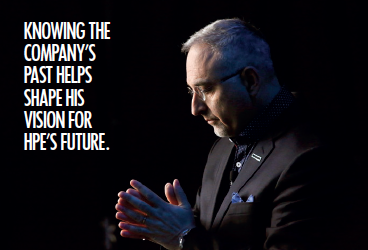Antonio Neri
Story by: Lola Arellano-Fryer
Photos by: Eric Draper Photography
Antonio Neri: CEO OF HEWLETT PACKARD ENTERPRISE
As the First Latino CEO of Hewlett Packard Enterprise, Antonio Neri Keeps People at the Center of Technology
When Antonio Neri succeeded Meg Whitman as CEO of Hewlett Packard Enterprise (HPE) six months ago, he became the first Latino to helm the storied technology giant. This role is the culmination of a nearly 25-year career with the company; Neri got his start by helping customers troubleshoot their tech issues from a call center in Amsterdam. He’s stayed with the company through multiple transitions and transformations, including Hewlett-Packard Company’s 2015 split that resulted in the creation of HPE. Originally from Argentina, Neri lived and worked in Latin America and Europe prior to moving to the United States. Neri moved with Hewlett-Packard across continents and through the ranks until he became CEO. His multi-national background gave him a unique point of view and international perspective on business that is central to what he brings to HPE as CEO. Neri is proof that Latinos bring a unique set of skills, experience, and perspective to C-suite roles. For Neri, there are four essential elements of HPE that are at the heart of his work as CEO: the people, the company, the culture, and the technology. Here is how each of these elements is taking shape at HPE under his leadership.
The People and the Culture:
Neri’s career began early, when he was encouraged by a member of the Argentine military to forego traditional middle school in favor of a military education. From the age of 15, Neri had a hands-on role working with the navy’s technology, beginning as an engineering apprentice. These early experiences grew into Neri’s passion for engineering and technology. He continued to work for the navy while attending high school and college (the Escuela Nacional de Educación Técnica and the Universidad Tecnólogica Nacional), wherehe advanced his education in engineering. For Neri, the role that mentorship played in a pivotal moment of his own life is proof that mentorship is a key ingredient when it comes to developing and nurturing talent. According to Neri, in order to succeed, you need people around you supporting you, who will allow you “to grow, to fail, to experiment.” He recognizes, too, that this mantle must be passed down through the generations of business leaders in order to encourage the next crop of talent. Continually nurturing future leaders is an essential element to the sustainability and big-picture growth of companies. Nurturing talent at a macro level means creating a corporate culture that supports and sustains employees’ growth. This type of culture thrives on the right chemistry and continuous forward momentum among employees. For Neri, building a culture that inspires and connects employees is vital to long-term success. Creating an environment that empowers leaders to make decisions is crucial for fostering engagement and inspiring innovation. “Sometimes you need to be more hands-on, sometimes you need to recognize progress and challenge people to raise the bar,” he says.
THe company:
When Neri took over the CEO role at HPE from Meg Whitman six months ago, the time was right to break a pattern of solely recruiting outside hires and to elevate from within. Neri brought with him his long-standing connection to the company – in his words, he “knows the company inside and out.” Knowing the company’s past helps shape his vision for HPE’s future, as well as his approach to being CEO: for Neri, it’s all about long-term stability and a far-seeing vision for the future. Neri didn’t take his call center job with Hewlett-Packard thinking that he’d be CEO someday. He did, however, join the company with ambitions: he hoped to someday become a general manager. He knew that he had a lot to bring to the table, including his international resume, multilingual ability, and engineering background – a combination of experience, education, and a unique, international perspective on the business of technology. Neri credits a combination of many things for his success: hard work, dedication, and a willingness to make sacrifices were all key components that were the result of his own gumption. He also recognizes it took a bit of luck, and being in the right place at the right time. Sometimes, being in the right place was the result of taking a risk when he saw the opportunity for growth. For example, he once took a lateral move to join the PC side of Hewlett-Packard, recognizing the growth potential within that sector. Whereas others might come into the role of CEO and make drastic changes, Neri’s priority is creating predictable, sustainable growth. He is cautious to discern where innovation and disruption are needed, but not to introduce radical change for its own sake. When he stepped into the role of CEO, for example, there were some shake-ups in personnel – it was important to introduce new approaches and perspectives, Neri says – but the transitions were not as all-encompassing as they could have been under new leadership.
The technology:
How does a technology giant stay nimble and move forward when the industry moves as a rapid pace? For Neri, the key is that every technological advance must make life better in some way. Technological advancement is not about making us beholden to technology, Neri cautions. For example, “[artificial intelligence] should be about helping the human, not replacing the human.” Given this human-centered approach to technology, it’s perhaps unsurprising that Neri’s passion for technology is inextricably connected to his passion for serving customers. Neri refers to the customer as his “North Star,” in that following the customer’s needs leads to the development of technology that makes a real impact in people’s lives. “In the end, if you focus on the customers, good things happen,” Neri says. And this, in the end, is where success and the future of HPE under Neri’s leadership lies: at the place where technological innovation and people intersect. +
“SOMETIMES YOU NEED TO BE MORE HANDS ON, SOMETIMES YOU NEED TO RECOGNIZE PROGRESS AND CHALLENGE PEOPLE TO RAISE THE BAR.”
What is HPE now?
Hewlett Packard Enterprise is a global technology leader focused on developing intelligent solutions that allow customers to capture, analyze and act upon data seamlessly from edge to cloud. HPE enables customers to accelerate business outcomes by driving new business models, creating new customer and employee experiences, and increasing operational efficiency today and into the future. In June 2018, the company pledged a $4B investment in intelligent edge technology, building on its leadership in this emerging and high-growth category. HPE’s goal is to bring together the brightest minds to create breakthrough technology solutions that advance the way people live and work.
by the numbers:
• Fiscal year 2017 combined net revenue:
$37.4 billion (as reported Nov. 21, 2017)
• Revenue for the third quarter of HPE’s fiscal year 2018:
$7.8 billion (as reported Aug. 28, 2018)
• Number of employees:
60,000+
Left/Right Brain
Neri proves the importance of both left- and right-brained thinking. In his role as CEO, he merges his engineer’s logical mind with a dose of creative thinking. Perhaps unsurprisingly, Neri is multi-talented: not only is he educated as an engineer, he has also trained as a professor of art and drawing at Norel Academy in Argentina.
the challenges of being a ceo:
According to Neri, the CEO has the loneliest job, because it’s the CEO who’s responsible for making all the big decisions. The skills that Neri considers most important to being CEO are also skills that he’s continually working to improve: first, maintaining a clear focus on priorities; second, acting as a strong leader while not losing touch with the organization.
Neri’s advice to future latino leaders:
“When you get your head into it, you can do it,” are Neri’s words of wisdom to aspiring Latino leaders. Work hard and build others’ trust in your ability to follow through. “You don’t usually see how many things had to fail in order to be successful,” Neri reminds. Keeping confidence in the face of failure is an essential trait of leadership.



